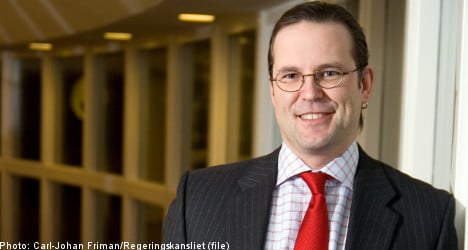The newspaper used three criteria to determine the rankings: political influence, economic situation by country — including unemployment, and credibility among surrounding countries in terms of confidence in each country’s long-term finances.
Germany’s Wolfgang Schäuble topped the list, followed by Poland’s Jacek Rostowski and France’s Christine Lagarde. Borg ranked third in the political category, eighth in the economic tally and seventh for credibility.
“Anders Borg has made Sweden the poster child for fiscal prudence, as healthy fiscal balances have helped make his economy one of Europe’s fastest growing,” Marco Annunziata, chief economist at Italian bank UniCredit, told the FT.
He also received top marks from SEB Group chief economist Robert Bergqvist, who pointed out that Sweden’s economy is expected to grow by 5 percent this year, while government debt is only 40 percent of GDP and falling.
However, Bergqvist also credited Sweden’s current strength and Borg’s successes in part to economic policies implemented by former Swedish prime minister Göran Persson, who served as finance minister from 1994 to 1996.
Borg also ranked fourth in 2008 and 2009, while Sweden was not included in the rankings in 2006 and 2007. Irish financial minister Brian Lenihan came in last, a sharp drop from the top of the rankings enjoyed by then-Irish finance minister Brian Cowen in 2006, the current prime minister (Taoiseach) of the country.
EU states that were not included in the survey included Bulgaria, Cyprus, Estonia, Latvia, Lithuania, Malta, Romania and Slovenia.
Separately, Lars Calmfors, chairman of the Swedish Fiscal Policy Council (Finanspolitiska Rådet), took a swipe at Borg in an open letter published in the Financial Times on Monday.
He compared Borg’s threat of cuts for the council’s budget to Venezuelan President Hugo Chavez’s decision to dissolve a similar council when criticism became too uncomfortable.
Calmfors expressed his criticisms in an open letter that was also signed by his British colleague Robert Chote, chairman of the Office for Budget Responsibility, and his Dutch counterpart Coen Teulings, director of the Central Planning Bureau.
The letter expressed the need for Hungary’s fiscal council to remain independent.



 Please whitelist us to continue reading.
Please whitelist us to continue reading.
Member comments